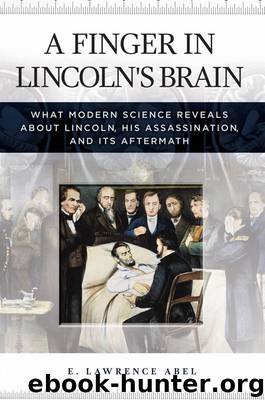A Finger in Lincoln's Brain: What Modern Science Reveals about Lincoln, His Assassination, and Its Aftermath by Abel E. Lawrence;

Author:Abel, E. Lawrence;
Language: eng
Format: epub
Publisher: ABC-CLIO, LLC
Published: 2014-12-02T16:00:00+00:00
Chapter 12
The Politics of Death
In August 1864, Lincoln’s chances of reelection were grim. Although he had been renominated at the Republican Convention, in June 1864, there was little enthusiasm behind the affirmation. Radical Republicans wanted Congress to have control over Reconstruction and wanted to put the Confederate states under temporary military control. When Lincoln vetoed that legislation, they accused him of “dictatorial usurpation.”1 The Richmond Examiner gloated, “Abraham Lincoln is lost. . . . [H]e will never be President again.”2
Lincoln’s Democratic opponent in the November election was General George McClellan, whose campaign slogan was “The War is a Failure. Peace Now!” A splintered Republican Party and a war-weary North would have given McClellan the presidency had it not been for General William Tecumseh Sherman’s timely capture of Atlanta on September 3, 1864. Sherman’s simple seven-word telegram, “Atlanta is ours, and fairly won,” put Lincoln back into the White House.3
It was a political turnabout unequaled in American history.4 Radical Republican Zachary Chandler claimed Sherman’s victory had produced the swiftest change in public opinion about Lincoln he had ever seen.5 Despite Lincoln’s reelection and the imminent end of the war, when John Wilkes Booth’s shot him, “There was no lonelier man in public life than Lincoln.”6 Within eight hours of Lincoln’s assassination, Radical Republican congressmen secretly met in caucus. Congressman George Julian, who was also no admirer of Lincoln, found the profanity directed at Lincoln at the caucus “intolerably disgusting.”
Though shocked at Lincoln’s murder, the universal feeling among Radical Republicans was that his assassination was a “godsend.”7 These were hard-nosed politicians whose ultimate raison d’être was political power. The reason they were elated was that they saw an opportunity to turn Lincoln’s assassination to their advantage. They were especially jubilant because they were confidant Andrew Johnson, Lincoln’s successor, would fall in with their vindictive plans for Reconstruction. If the South, which was largely politically Democrat, were readmitted to the Union in line with Lincoln’s policy of conciliation, Republicans would lose their majority because the Democratic South would ally with Union Democrats.
On the morning of Easter Sunday, April 16, while most Americans were in church, Julian, Charles Sumner, Benjamin Wade, and others chosen by the Radical Republican caucus met with President Johnson to ask what he was planning to do about punishing those responsible for the assassination. Johnson thanked them for their support and told them they could infer his intention from what he had said about treason in the past: treason was a crime, and traitors had to be severely punished. Congressman Benjamin Wade was ecstatic. Lincoln had vetoed the bill he and Congressman Henry Wade had sponsored that would have given Congress control over Reconstruction. “By the gods,” he whooped, “[now] there will be no trouble running the government.”8
Secretary of War Edwin Stanton was also a Radical Republican. Although he had loyally served Lincoln, he had not agreed with Lincoln’s conciliatory plans for Reconstruction. Stanton was just as committed as his Radical Republican colleagues to disenfranchising Southern Democrats and giving blacks
Download
This site does not store any files on its server. We only index and link to content provided by other sites. Please contact the content providers to delete copyright contents if any and email us, we'll remove relevant links or contents immediately.
| Archaeology | Essays |
| Historical Geography | Historical Maps |
| Historiography | Reference |
| Study & Teaching |
Underground: A Human History of the Worlds Beneath Our Feet by Will Hunt(12085)
Sapiens by Yuval Noah Harari(5365)
Navigation and Map Reading by K Andrew(5150)
The Sympathizer by Viet Thanh Nguyen(4384)
Barron's AP Biology by Goldberg M.S. Deborah T(4145)
5 Steps to a 5 AP U.S. History, 2010-2011 Edition (5 Steps to a 5 on the Advanced Placement Examinations Series) by Armstrong Stephen(3724)
Three Women by Lisa Taddeo(3422)
Water by Ian Miller(3177)
The Comedians: Drunks, Thieves, Scoundrels, and the History of American Comedy by Nesteroff Kliph(3068)
Drugs Unlimited by Mike Power(2590)
A Short History of Drunkenness by Forsyth Mark(2290)
DarkMarket by Misha Glenny(2207)
And the Band Played On by Randy Shilts(2197)
The House of Government by Slezkine Yuri(2191)
The Library Book by Susan Orlean(2064)
Revived (Cat Patrick) by Cat Patrick(1987)
The Woman Who Smashed Codes by Jason Fagone(1969)
The Absolutely True Diary of a Part-Time Indian by Sherman Alexie(1903)
Birth by Tina Cassidy(1901)
